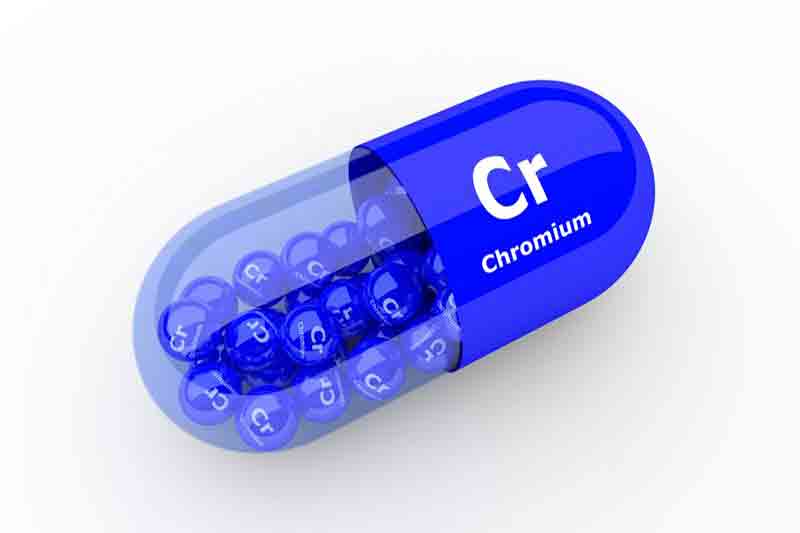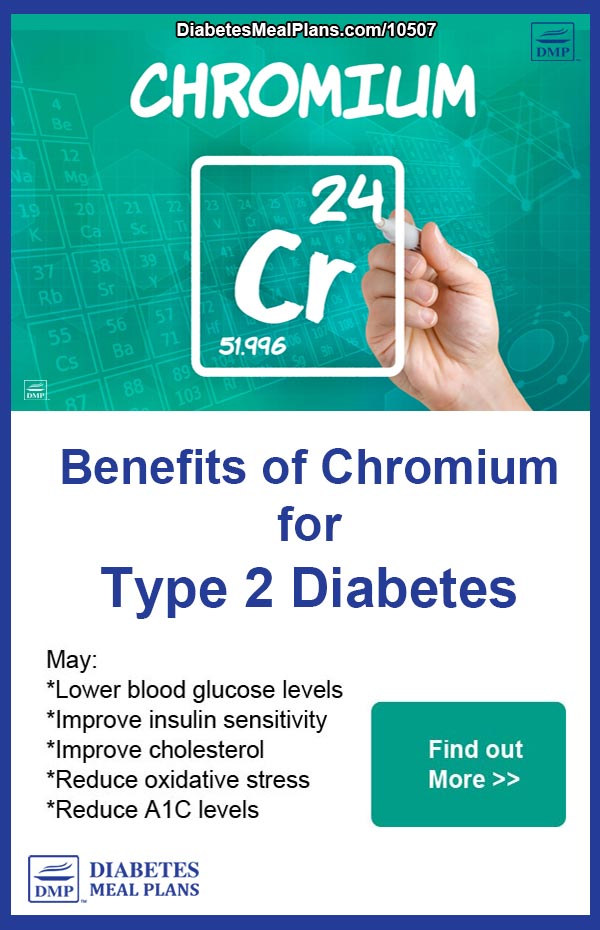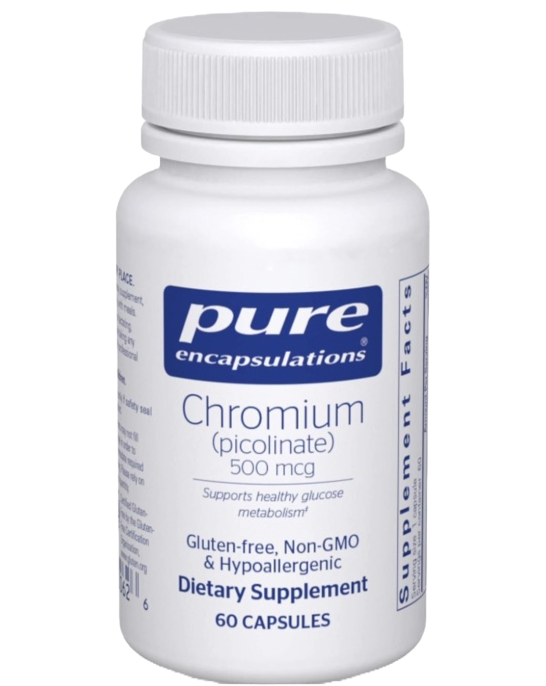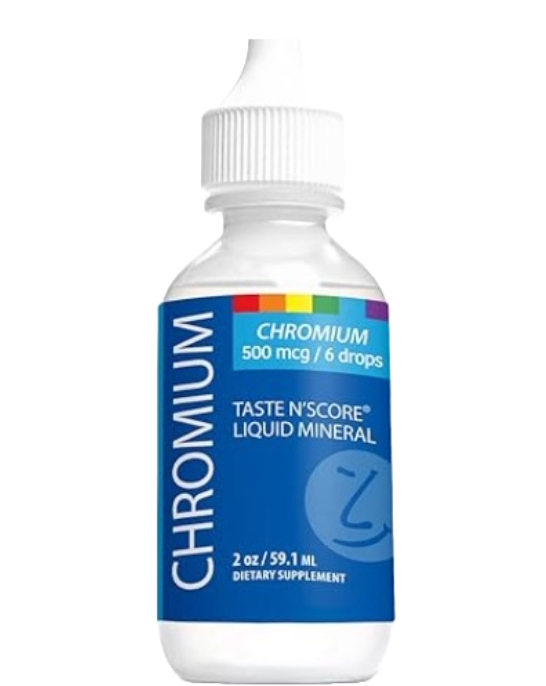Chromium is an essential trace mineral found in our bodies. It’s required for a number of bodily functions, one of which is the proper digestion of food.
On top of this, levels of chromium in our blood have been linked to eye health, with low levels increasing the risk of glaucoma (an eye condition you’re at increased risk of with diabetes).
Chromium can also slow down calcium loss from our bones. And in terms of the benefits of chromium picolinate for diabetes, this essential mineral may help you manage your condition.
What is known for certain about chromium is that it’s vital for human nutrition and is required for insulin to function normally.
Surprisingly, this function was discovered by chance – patients receiving liquid nutrition in a hospital were developing diabetes, but a diagnoses of type 2 diabetes was prevented once chromium was added to the liquid nutrition.
Let’s explore chromium in a little more detail…

DISCLAIMER
Please note that this information is not an endorsement for chromium. We are simply sharing the research surrounding it. You should always discuss supplementation with your doctor.
How does chromium work?
Chromium binds to a special protein within cells called low-molecular weight chromium binding substance (LMWCr). This substance switches it into its active form.
Once activated, it exerts several metabolic influences, one of which is the LMWCr binds to insulin receptors within beta-cells in the pancreas and potentiates their activity. Or in simpler terms, it amplifies the action of insulin as it carries out its function of helping glucose in the bloodstream get into cells.
Some research even suggests that this chromium-mediated amplification may increase the activity of insulin by 7 times its normal speed!
Chromium may influence metabolism
If you have diabetes, you have metabolic syndrome – a condition of altered metabolism – symptoms of which include hypertension, abdominal obesity, dyslipidemia, impaired glucose tolerance, and insulin resistance.
Chromium is needed for glucose metabolism, whereby it acts as a second messenger in the cells to help enhance the function of insulin. And as you will soon read below, studies have shown it may reduce blood sugar levels and A1C.
In several animal studies it has been shown to play a central role in reducing obesity and hypertension. Though, in terms of these functions, at this stage evidence in humans is limited.
Chromium may reduce blood glucose levels
The most bioavailable form (i.e. form that is most readily absorbed in your blood) of chromium is ‘chromium picolinate.’ And supplementation of chromium picolinate in diabetic patients has shown some pretty impressive results.
Several rat studies have shown chromium intake prevents hyperglycemia (high blood sugar). And in terms of clinical trials in humans, there have been a few.
In 71 poorly controlled type 2 diabetics, researchers gave them 600μg/day chromium picolinate over a 4 month period. They were eating the typical American Diabetes Association diet (pretty high in carbs), and still took their regular medications. The results showed that the supplemented group had reduced fasting glucose of 31.0mg/dL (1.7 mmol/l), reduced post meal glucose by 37.0mg/dL (2 mmol/l), and they had a 1.9% lower A1c compared to just 1% in the non supplemented group.
A Chinese study conducted in 180 diabetic patients administered either placebo, 100 mcg or 500 mcg of chromium picolinate twice daily for the duration of 4 months, found that at the conclusion of the study, those being supplemented at 500 mcg had improvement in all of their outcomes!
Their fasting and post meal blood glucose levels decreased, insulin levels decreased and their levels of A1C also dropped.
The same researchers conducted another study whereby chromium picolinate was supplemented in 833 poorly controlled diabetic patients, 500 mcg daily. All diabetics in the study were on medications or taking insulin. The fasting and post meal glucose improved in 90% of people.
Before taking chromium average fasting levels were 180 mg/dl (10 mmol/l) and after taking chromium they reduced to 144 mg/dl (8 mmol/l). Post meal glucose reduced from an average 216 mg/dl (12 mmol/l) to 178 mg/dl (9.9 mmol/l).
Another review of clinical trials confirms the effect of chromium to lower fasting blood glucose in particular.
Overall, these studies suggest chromium may be of great benefit to blood sugar regulation.

Chromium may improve cholesterol levels
According to research, chromium picolinate may help reduce LDL (‘bad’ cholesterol) and increase levels of HDL (‘good’ cholesterol). Having elevated blood lipids is pretty common in type 2 diabetes, which puts you at increased risk of atherosclerosis (artery blockage) and can eventually lead to heart attacks and stroke.
A review of clinical trials of chromium supplementation in type 2 diabetics showed an average total cholesterol reduction of 6.7 mg/dl (0.37 mmol/l).
One clinical trial found that heart disease risk factors significantly improved from chromium supplementation in type 2 diabetic subjects – lower triglyceride levels and a change in the LDL/ HDL ratio.
Chromium acts as an antioxidant
There are increased levels of oxidative stress in type 2 diabetes. Oxidative stress is where dangerous free radicals (unstable cells) travel through the bloodstream threatening to attack healthy cells and triggering inflammatory reactions.
Chromium supplementation has been shown to reduce oxidative stress in diabetic patients. This likely occurs due to chromium’s potent antioxidant activities. Basically, chromium binds to these unstable free radicals preventing them from doing damage to your body’s cells.
Chromium benefits
Current research has found the following benefits of chromium in relation to type 2 diabetes:
- Lowers blood glucose levels
- Improves insulin sensitivity
- Improves blood lipid profile
- Reduces effects of oxidative stress
- Reduces A1C levels
Chromium side effects
An overdose of chromium supplements can cause stomach problems and low blood sugar levels (hypoglycemia). Excessive chromium can also lead to organ damage and irregular heart rhythms.
Chromium supplements
Chromium picolinate is the natural form of chromium and therefore, the most potent form of supplementation, which withstands the powerful effects of our stomach acid. Other types of chromium are synthetic forms that are not as bioavailable to your body.
The US Institute of Medicine has set the adequate intake of chromium at 20-35 μg/day for adults.
According to research, the suggested dosage is around 500 mcg per day, with common dosages taken ranging from 50 to 200 μg. However, please note, supplements should always be taken under the guidance your physician doctor.
Chromium food sources
Traces of chromium can be found in many vegetables, fruits and meats, though higher sources include:
Please pin, tweet or share this info. Thanks!





Debbie Voss
Hello thank you for this article. I take Berberine – 500 it has Berberine , Cinnamon and Chromium (as chromium polynicotinate 72 mcg….60%). This is not the kind that you speak of. Should I stop taking this product and just use straight Berberine with the chromium you talk about? I am taking this on my own with no doctor input.
Debbie
Jedha
According to research, berberine and cinnamon and two other natural substances that are beneficial. We have info on cinnamon here and some info coming on berberine soon. As for chromium, the research does seem to indicate that picolinate is the most beneficial, I’m not sure about other forms as we can only report on what the science shows.